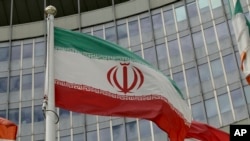On November 21, the International Atomic Energy Agency, the IAEA, adopted a resolution expressing “profound concern that Iran has still not provided the necessary, full and unambiguous cooperation with the Agency and has not taken the essential and urgent actions” that would allow the IAEA “to provide assurance that Iran’s nuclear program is exclusively peaceful.”
France, Germany, and the United Kingdom - known as the E3 - along with the United States, proposed the resolution adopted by the IAEA Board of Governors. Speaking for the four countries in introducing the resolution, British Ambassador to the IAEA Corinne Kitsell noted that the IAEA’s ability to provide assurance about Iran’s nuclear program “is central to the integrity of the safeguards system and global non-proliferation regime. As we have said, the outstanding issues and the issue of discrepancy in Iran are not historical – they are active concerns.”
The Governments of the E3 and the United States issued a joint statement after the resolution was adopted, welcoming the action. They noted that “Iran is legally obligated under its Nuclear Non-Proliferation Treaty (NPT) Safeguards Agreement to cooperate fully with the IAEA and account for all nuclear material and activities.” They pointed out that for more than five years, the IAEA Director has tried to engage Iran in substantive dialogue on Iran’s unresolved, issues, and Iran has responded “with threats and provocations.”
In the joint statement, the four nations said it is “essential and urgent” that Iran resolve its nuclear issues and noted that the resolution also asks the IAEA to produce a comprehensive and updated assessment which will summarize the Agency’s findings over five years of investigations.
“We hope,” they said, “Iran will take the opportunity between now and that report to finally provide the information and cooperation needed to resolve these issues, so that the Agency is able to provide assurance that Iran’s program remains exclusively peaceful, and the Board can close consideration on this matter. If it does not, it will be important that the Board remain engaged to meet the challenge that Iran’s continued refusal to meet its NPT-related nuclear verification obligations would present, including to the credibility of the global IAEA safeguards regime.”
The E3 and the United States concluded, “We expect Iran to reengage on the path of dialogue and cooperation with the Agency.”






